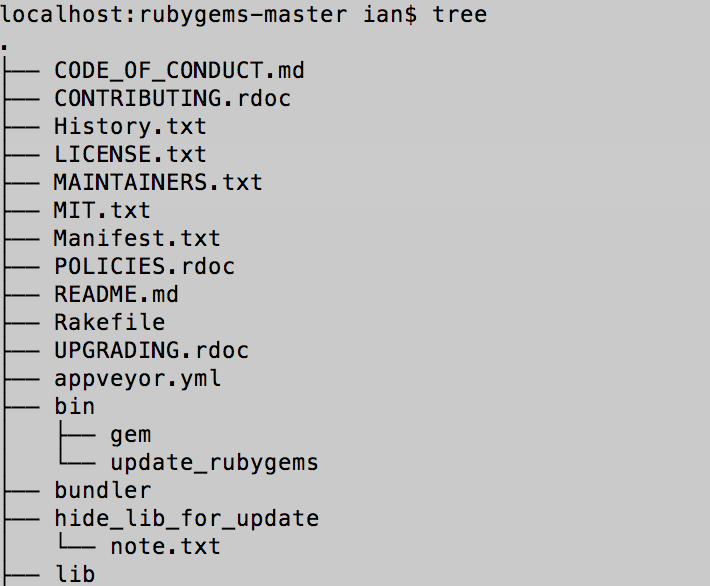on
Cocoapods命令行是怎么工作的?
本篇内容工作环境在Mac OS下
做iOS开发的同学都知道Cocoapods,一个非常棒的包管理工具,最常用的命令基本上就是命令行工具了, 例如: pod init, pod install, pod update等等.但是这些命令行工具是怎么样运行的呢? 内部执行了什么命令呢? 下面让我们一起从头开始看:
安装
首先需要安装Cocoapods, 详细教程请移步官网.
>$ sudo gem install cocoapods
从这个命令可以看到使用了gem命令工具集的install命令, 带有cocoapods参数
那么gem命令工具集是什么?
当然大家肯定都知道是RubyGem,它是一个Ruby的包管理工具, 详细见官网
gem安装命令:
>$ gem update --system # may need to be administrator or root
当安装完以上, 就可以直接使用Cocoapods命令行了, 为什么呢?
Gem的工作
当安装完gem和Cocoapods之后,查看下Cocoapods的安装目录:
>$ gem environment

从输出中找到 INSTALLATION DIRECTORY路径, 因为版本不同可能路径不尽相同, 大致是这样的:
/usr/local/lib/ruby/gems/2.3.0
在路径下的gems文件夹就可以看到所有本地安装的Ruby包了
从输出中找到EXECUTABLE DIRECTORY目录 /usr/local/bin, 打开后会发现许多可执行命令文件,其中就包含了pod这个我们使用的命令工具
这个pod命令工具就是Gem在安装cocoapods的时候生成在/usr/local/bin
Terminal启动后, bash在执行命令的时候都会在系统路径中查找命令是否存在
接下来, 查看一下系统路径: $PATH
>$ echo $PATH

从输出结果可以看到/usr/local/bin路径是在系统环境变量中的, 所以目录下的可执行文件可以被bash找到并执行
至此,已经看到了可以在命令行中使用pod命令的原因[微笑], 这就完了么?
往下看, gem是如何生成pod命令文件的? pod命令行工具的命令是如何执行的呢?
.gemspec文件
要使用Gem来管理Ruby包, 就需要编写gemspec文件, 来看下cocoapods的gemspec文件
# encoding: UTF-8
require File.expand_path('../lib/cocoapods/gem_version', __FILE__)
require 'date'
Gem::Specification.new do |s|
s.name = "cocoapods"
s.version = Pod::VERSION
s.date = Date.today
s.license = "MIT"
s.email = ["eloy.de.enige@gmail.com", "fabiopelosin@gmail.com", "kyle@fuller.li", "segiddins@segiddins.me"]
s.homepage = "https://github.com/CocoaPods/CocoaPods"
s.authors = ["Eloy Duran", "Fabio Pelosin", "Kyle Fuller", "Samuel Giddins"]
s.summary = "The Cocoa library package manager."
s.description = "CocoaPods manages library dependencies for your Xcode project.\n\n" \
"You specify the dependencies for your project in one easy text file. " \
"CocoaPods resolves dependencies between libraries, fetches source " \
"code for the dependencies, and creates and maintains an Xcode " \
"workspace to build your project.\n\n" \
"Ultimately, the goal is to improve discoverability of, and engagement " \
"in, third party open-source libraries, by creating a more centralized " \
"ecosystem."
s.files = Dir["lib/**/*.rb"] + %w{ bin/pod bin/sandbox-pod README.md LICENSE CHANGELOG.md }
s.executables = %w{ pod sandbox-pod }
s.require_paths = %w{ lib }
# Link with the version of CocoaPods-Core
s.add_runtime_dependency 'cocoapods-core', "= #{Pod::VERSION}"
s.add_runtime_dependency 'claide', '>= 1.0.2', '< 2.0'
s.add_runtime_dependency 'cocoapods-deintegrate', '>= 1.0.2', '< 2.0'
s.add_runtime_dependency 'cocoapods-downloader', '>= 1.2.0', '< 2.0'
s.add_runtime_dependency 'cocoapods-plugins', '>= 1.0.0', '< 2.0'
s.add_runtime_dependency 'cocoapods-search', '>= 1.0.0', '< 2.0'
s.add_runtime_dependency 'cocoapods-stats', '>= 1.0.0', '< 2.0'
s.add_runtime_dependency 'cocoapods-trunk', '>= 1.3.0', '< 2.0'
s.add_runtime_dependency 'cocoapods-try', '>= 1.1.0', '< 2.0'
s.add_runtime_dependency 'molinillo', '~> 0.6.5'
s.add_runtime_dependency 'xcodeproj', '>= 1.5.7', '< 2.0'
## Version 5 needs Ruby 2.2, so we specify an upper bound to stay compatible with system ruby
s.add_runtime_dependency 'activesupport', '>= 4.0.2', '< 5'
s.add_runtime_dependency 'colored2', '~> 3.1'
s.add_runtime_dependency 'escape', '~> 0.0.4'
s.add_runtime_dependency 'fourflusher', '~> 2.0.1'
s.add_runtime_dependency 'gh_inspector', '~> 1.0'
s.add_runtime_dependency 'nap', '~> 1.0'
s.add_runtime_dependency 'ruby-macho', '~> 1.1'
s.add_development_dependency 'bacon', '~> 1.1'
s.add_development_dependency 'bundler', '~> 1.3'
s.add_development_dependency 'rake', '~> 10.0'
## Make sure you can build the gem on older versions of RubyGems too:
s.rubygems_version = "1.6.2"
s.required_rubygems_version = Gem::Requirement.new(">= 0") if s.respond_to? :required_rubygems_version=
s.required_ruby_version = '>= 2.0.0'
s.specification_version = 3 if s.respond_to? :specification_version
end
文件中只做了一件事情, 就是初始化了一个Specification类的对象, 并为这个对象配置了各种参数
其中我们注意到 pod命令是赋值给了 s.executables, Sepcification对象的executables接收一个数组,其中包含了可执行的命令行工具文件, 这些文件必须放在根目录的bin文件夹下面,这个是RubyGem的规范, 具体可以查看官网
我们继续
找到RubyGem源码

我们从
>$ sudo gem install cocoapods
这条指令开始看一下RubyGem是如何创建pod命令行文件的
打开/bin/gem文件
#!/usr/bin/env ruby
#--
# Copyright 2006 by Chad Fowler, Rich Kilmer, Jim Weirich and others.
# All rights reserved.
# See LICENSE.txt for permissions.
#++
require 'rubygems'
require 'rubygems/gem_runner'
require 'rubygems/exceptions'
required_version = Gem::Requirement.new ">= 1.8.7"
unless required_version.satisfied_by? Gem.ruby_version then
abort "Expected Ruby version #{required_version}, is #{Gem.ruby_version}"
end
args = ARGV.clone
begin
Gem::GemRunner.new.run args
rescue Gem::SystemExitException => e
exit e.exit_code
end
gem命令调用了Gem::GemRunner的run方法,并传入了命令参数打开
gem_runner.rb的run方法可以看到,根据参数做了分发指令的操作,会调用到/lib/rubygem/commands/xxx_command.rb, 这里调用了install命令, 所以打开install_command.rb文件, 调用到execute方法
install_command.rb在安装的时候会调用/lib/rubygem/install.rb中的install方法,这里是hook的地方,可以允许用户按照规则在安装前后进行一些操作最终 执行了
install.rb中的generate_bin方法,生成了我们在CLI中调用的可执行文件,这里是根据gemspec文件中s.executables = %w{ pod sandbox-pod }指定的两个命令行工具 来生成的
Over~
pod命令的工作
但是,例如当我们执行pod init的时候, 又是如何工作的呢?
这个就比较容易了, 照例我们打开(根据你的bin目录)/usr/local/bin/pod文件
#!/usr/local/opt/ruby/bin/ruby
#
# This file was generated by RubyGems.
#
# The application 'cocoapods' is installed as part of a gem, and
# this file is here to facilitate running it.
#
require 'rubygems'
version = ">= 0.a"
if ARGV.first
str = ARGV.first
str = str.dup.force_encoding("BINARY") if str.respond_to? :force_encoding
if str =~ /\A_(.*)_\z/ and Gem::Version.correct?($1) then
version = $1
ARGV.shift
end
end
load Gem.activate_bin_path('cocoapods', 'pod', version)
可以看到最后一行调用了Gem的activate_bin_path方法,参数的意思是寻找包名为cocoapods的pod命令, Gem会在gems的安装目录中寻找这个包,然后调用包中/bin/下的相应命令文件,在这里会调用/usr/local/lib/ruby/gems/2.3.0/gems/cocoapods-1.5.0/bin目录下的pod文件
总结:所有通过Gem安装的工具,最终会通过Gem找到安装目录中的源码bin目录下的相应文件执行
然后, 打开cocoapods源码中的pod命令文件
#!/usr/bin/env ruby
if Encoding.default_external != Encoding::UTF_8
if ARGV.include? '--no-ansi'
STDERR.puts <<-DOC
WARNING: CocoaPods requires your terminal to be using UTF-8 encoding.
Consider adding the following to ~/.profile:
export LANG=en_US.UTF-8
DOC
else
STDERR.puts <<-DOC
\e[33mWARNING: CocoaPods requires your terminal to be using UTF-8 encoding.
Consider adding the following to ~/.profile:
export LANG=en_US.UTF-8
\e[0m
DOC
end
end
if $PROGRAM_NAME == __FILE__ && !ENV['COCOAPODS_NO_BUNDLER']
ENV['BUNDLE_GEMFILE'] = File.expand_path('../../Gemfile', __FILE__)
require 'rubygems'
require 'bundler/setup'
$LOAD_PATH.unshift File.expand_path('../../lib', __FILE__)
elsif ENV['COCOAPODS_NO_BUNDLER']
require 'rubygems'
gem 'cocoapods'
end
STDOUT.sync = true if ENV['CP_STDOUT_SYNC'] == 'TRUE'
require 'cocoapods'
if profile_filename = ENV['PROFILE']
require 'ruby-prof'
reporter =
case (profile_extname = File.extname(profile_filename))
when '.txt'
RubyProf::FlatPrinterWithLineNumbers
when '.html'
RubyProf::GraphHtmlPrinter
when '.callgrind'
RubyProf::CallTreePrinter
else
raise "Unknown profiler format indicated by extension: #{profile_extname}"
end
File.open(profile_filename, 'w') do |io|
reporter.new(RubyProf.profile { Pod::Command.run(ARGV) }).print(io)
end
else
Pod::Command.run(ARGV)
end
哈哈, 看到文件中经过一些判断后, 最终执行了 Pod::Command的run方法,这里又调用了/lib/cocoapods/command/init.rb文件的run方法, 完成创建Podfile文件操作
最后, 经过RubyGem的安装调度,回调到某个gem的源码中执行命令